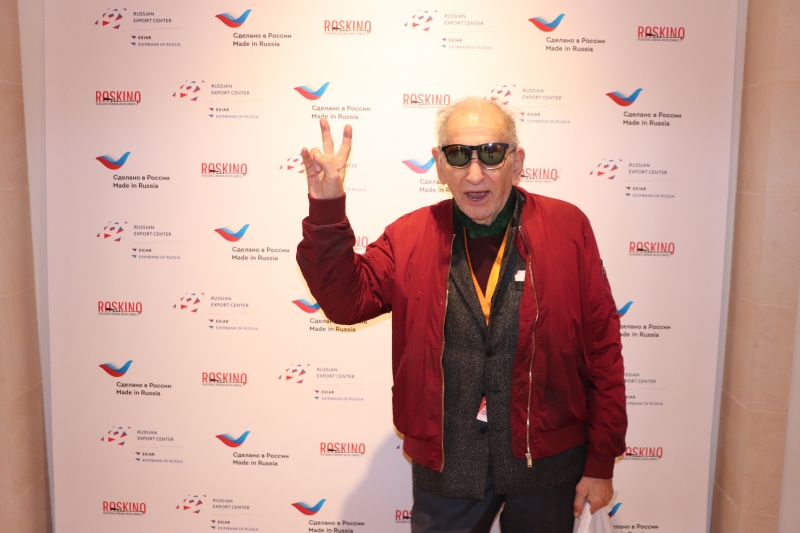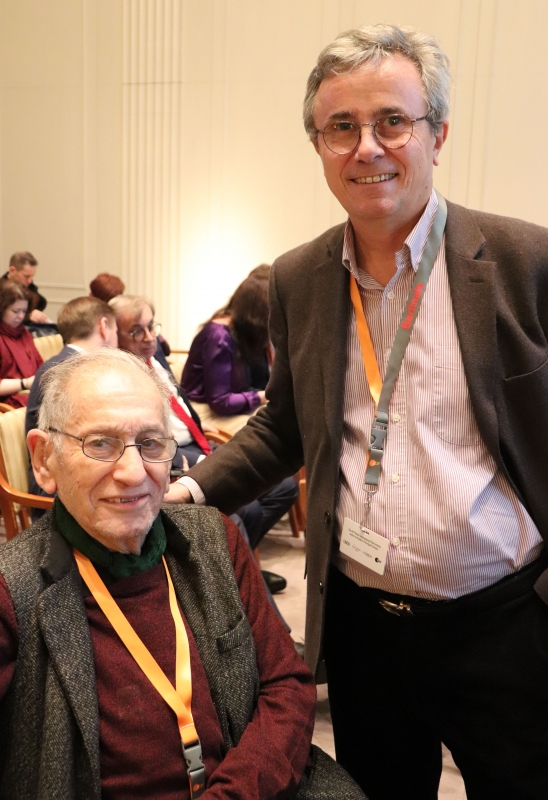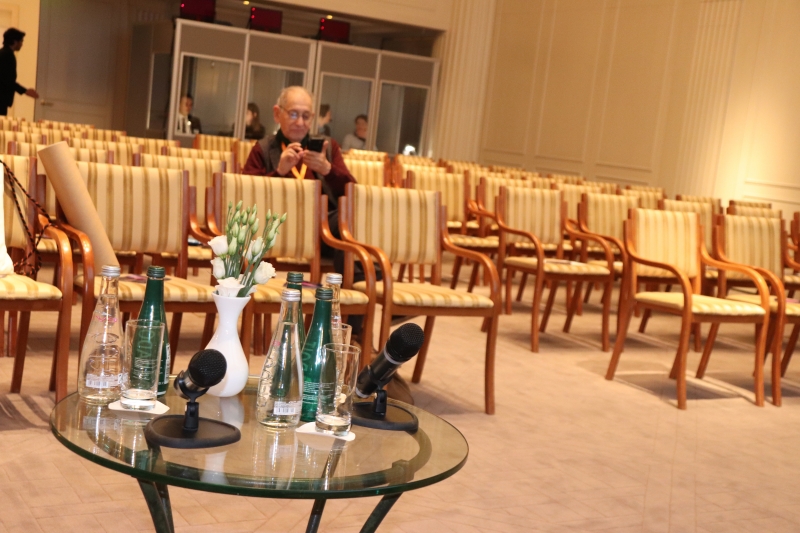|
|
||
|
Pro Tools
FILMFESTIVALS | 24/7 world wide coverageWelcome ! Enjoy the best of both worlds: Film & Festival News, exploring the best of the film festivals community. Launched in 1995, relentlessly connecting films to festivals, documenting and promoting festivals worldwide. Working on an upgrade soon. For collaboration, editorial contributions, or publicity, please send us an email here. User login |
New Magyar Film, "1945", is a Knockout
Reviewed by Alex Deleon, Budapest 12 August 1945, 11 AM. Two mysterious strangers dressed in black appear at the railway station of a Hungarian village. Within a few hours, everything changes... The film 1945 was premiered at Berlin in February but only viewed here in Budapest on first commercial release in April. Last year a modestly made Hungarian film "Son of Saul" raised eyebrows when it took the grand Prix at Cannes and also the best foreign language film award at the 2016 Oscars plus a Golden Globe award for best film. It would perhaps be somewhat heretical to say that this relatively minor work with unknown actors by a debuting director (Laszló Nemes, age 40) was highly overrated -- but the subject was compelling forcing viewers to take a different view of the Nazi death camps, from the point of view of a Jew forced into collaboration with the Germans who were murdering other Jews all around him day and night. Hard to overlook, but in a sense a grisly gimmick film and very much in-your-face although it was not particularly well made nor can it even carry the shoelaces of a new Hungarian Holocaust related film, 1945, a subtly crafted masterpiece by Ference Török, a 46 year old veteran with a twenty film filmography stretching back to 1999. The over-acclaimed Son of Saul was about Auschwitz and the bad guys were the Germans -- thus a safe subject for a Hungarian filmmaker to undertake. In 1945 the bad guys are Hungarians -- a whole townfull of them, who collaborated cynically in the deportation of their Jewish neighbors and profited extensively by taking over their goods and confiscated properties. Not a very safe subject for a Hungarian-- as it is one which churns up highly unpleasant historical realities for current day Hungarians when many come directly from families who collaborated with the Hungarian Fascists during the extrication of Jews from Hungarian soil. Immediately after the screening I asked one Hungarian college age girl what the film made her feel and, though she was of Jewish background and had come with her parents to see it, it took her a long moment to come up with an answer ... and then it was one word "shame". Shame as a Hungarian, obviously -- not shame at being Jewish. In short, even though this is a fantastically well made film, with some of Hungary's most adept and popular actors in the key roles all shot in masterly black and white by the most respected living Hungarian cinematographer, Elemér Ragályi, 78, this is not the kind of subject that is going to attract non-Jewish Hungarian audiences in droves -- simply because it is too stark a reminder of a shameful not so distant past that many if not most would rather shove under the rug. The film is based on a recently published short story entitled "Homecoming" and it all takes place in a single day in mid August 1945 -- just days after the atomic bombing of Nagasaki, which we hear about on the radio shortly after the beginning of the film --- thus placing it squarely in the context of major crimes against humanity. But this is only the beginning of a tense summer day in a dusty backwater Hungarian town that will take on overtones of High Noon and the Three-Ten to Yuma before the day is over ... As the film opens a shortened old fashioned train comes chugging into the station under a black cloud of smoke and two passengers, obviously orthodox jews clad in black, emerge, one an elderly man with a white beard, the other his son. Next to the station we see a jeep with two Russian soldiers hanging around -- Hungary was only recently liberated and is under tentative Russian military occupation. A crate belonging to the Jews is unloaded. The old man signs a form stating that the contents are perfumes. Fine and dandy. But what is really in them we will only find out later. Next ensues a slow somber parade to and through the entire town with the two Jews on foot trailing the horse and cart on which their mysterious cargo has been loaded. As various townspeople watch from their windows alarm begins to spread that this may be merely the tip of the iceberg and when more Hungarian Holocaust survivors follow they will have to return their ill gotten goods and houses. The chief alarmer is István Szentes, the town ckerk who, we will find out, denounced his best friend a Jew by the name of Pollak, and took over his highly profitable drug store with forged papers to justify his ownership. (Actor Peter Rudolf, 77, incredibly compelling and outrageously cynical in the role --well worthy of a Hungarian Oscar!). One by one others, including the town priest are swept up in the general guilt ridden anxiety. Some are appalled by the dirty history of the town and have varying pangs of conscience. For, above all, this is a film about collective guilty conscience. Istvan's son Árpád who now runs the falsely acquired Pollak drugstore and is scheduled to be married that very afternoon, is so appalled by his father's callousness that he runs out on both the unwanted marriage and the unwanted business, and heads to the train station to catch the 3:10 back to Budapest -- hoping to start a new life away from all this internal rot and corruption. András Kustár, the town drunk, blabs loose tonguedly in the local pub about the sins everybody knows about but would rather not know. Himself guilt ridden over his own illgotten family gains and the fact that he allowed himself to be tricked into signing a document turning the drugstore over to the town clerk he goes to the church in the middle if the day and asks the priest to grant him confession. But the priest has Jewish skeletons in his own closet and sends poor András off with ten Hail Mary's chiding him for daring to come to the house of God in drunken condition. Mrs. Kustár, a total conscienceless shrew (veteran actress Ági Szirtes, terrific!) scurries to hide expensive Carpets in her cellar, just in case these Jewish men in black start to make claims for restitution of their property. The central figure of all this panic is Town clerk and drugsrore owner Szertes István as portrayed with extreme negative verve by Peter Rudolf. The drugstore alone is the most profitable business in the town and he has the most to lose. Worst of all, his morphine addicted wife will have none of this hypocrisy and accuses him openly of betraying his best friend Pollak who was then sent to Auschwitz. And also, indirectly of forcing their son to leave town. András, the alcoholic husband of unscrupulous Madame Kustár hangs himself in the barn, dying, in a sense, for the sins of all. A climax is reached when the abandoned bride who would have become the daughter in law of Szertes vengefully sets the prized drugstore on fire. When Szertes runs to the church where a mass is being held for hanged András he is seen as the cause of all their problems and nobody is willing to help him put out the fire. The drugstore burns down. In a heart wrenching denoument Szertes, who is kind of an acting mayor, cynically assures the two Jews who have finished their mission that the town will now forever preserve the memory of their lost Jews. And now we're back at the train station waiting for the 3:10 back to the capital. Son Árpád Szertes who fled the drugstore and ran out on his arranged marriage is there waiting to depart along with the men in black and we know he will never come back to this mentally diseased home town. Mrs. Szertes, the addicted wife of the town clerk is played with utter abandon by one of Hungary's leading actresses, Eszter Nagy-Kálózy who is the real life wife of actor Peter Rudolf --astounding as the cynical SOB at the center if the story. In an interview Peter Rudolf stated that it was a great honor for him to be selected by Ferenc Török for the critical central role of such an important Hungarian picture. The two Jews have almost nothing to say in the film but are a spectral presence used to maximum effect by director Török to create an atmosphere of tense confrontation oddly similar to the American western High Noon. The faceoff however is not between good guys and bad guys but between an entire town and its ruinously bad conscience.
The future outlook for 1945. 1945 is definitely a Knockout, a TKO -- but The Question now is who besides Hungarian Jews are going to actually see this important new Hungarian movie? Although 1945 received a rave review in VARIETY at Berlin it was relegated to the Panorama section thus not eligible for a Palme d'Or. Maybe the French didn't like the possibility of two Hungarian films taking the cake in successive years. Moreover, having already been exposed at a major festival 1945 is not eligible for competition in other major festivals. It will of course make the rounds in one category or another and is a natural for the marginal Jewish film circuit but emerging so early in calendar year 2017 it is not likely to be a candidate for best foreign language film next year at the 2018 Oscars. Whether it will eventually find the recognition it justly deserves in Hungary or elsewhere is an open question depending to some extent on the way it is handled by various distributors. The bottom line is that 1945 is a much much better film than "Son of Saul", the other recent Hungarian-made Holocaust opus, but due to the peculiar circumstances of timing and taste (bad taste) it is likely to remain as "the other Hungarian film" about the Holocaust, rather than the definitive artistic statement on the subject that it actually is.
Peter Rudolf and Nagy-Kálózy Eszter, stars of 1945 and two of Hungary's leading actors are a long term happpily married couple and the subject of a three page spread in the Hungarian edition of HELLO.
15.05.2017 | ALEX FARBA's blog Cat. : FILM
|
LinksThe Bulletin Board > The Bulletin Board Blog Following News Interview with IFTA Chairman (AFM)
Interview with Cannes Marche du Film Director
Filmfestivals.com dailies live coverage from > Live from India
Useful links for the indies: > Big files transfer
+ SUBSCRIBE to the weekly Newsletter Deals+ Special offers and discounts from filmfestivals.com Selected fun offers
> Bonus Casino
User imagesAbout ALEX FARBAThe Editor |






























